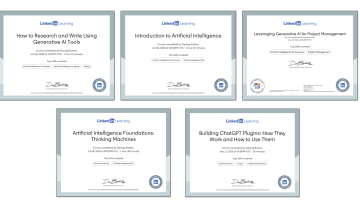Freelancing 2.0 - Why I Did Everything So I Don’t Have To Do Everything

One of the descriptions that's often applied to freelancers is that they behave like a herd of cats: forced together by common interest, but solitary and singular and, to a large extent, behaving like little one-man bands.
Many of them complain about low income, terrible rates, about clients who don't value their work. All true. Freelance writers have been facing stagnant rates - and rights grabs - for the better part of three decades. As the Internet shredded the business model of much of mainstream media, their paying customers, it also brought into play 'citizen journalists' who are happy to write for exposure. And there is no shortage of media outlets more than willing to join the race to the bottom line. Even if, like the Huffington Post, they're actually making gobs of money from the free work of the people who provide the bulk of their content.
'I Can't Afford to Farm Anything Out'
Yet far too many freelancers think that because times are tough, they need to do everything: "I can't afford," the thinking goes, "to farm anything out." And that applies to not just the fundamentals like research and writing, but to bookeeping, photography, website design, marketing, video production.
So let's explore the latter for a minute: video production.
Even for talented photographers, video production is usually a challenging transition thanks to the introduction of a couple of significant add-ons: sound and motion. For non- or totally amateur photogs, the learning curve is almost ridiculously steep.
Don't believe me? Five minutes on YouTube should convince you that just having access to a camera and a microphone - usually on the same device - does not a videographer make.
Shaky images, unintellible audio, silouhettes of heads with bright lighting behind them, every video transition in the book, and non-stop panning and zooming enough to make even the hardiest sailor spew over the side.
But if you want to learn how to make decent video, you need to learn about camera angles, depth of field, lighting fundamentals, capturing good audio, how to develop and convey a story arc, file formats, aspect ratios. And so on. Not insurmountable, because there are thousands of people who get it, but a fairly steep climb that takes dedication, time and effort.
I've been through the learning wars - made hundreds of mistakes - and now feel confident that I can shoot and edit competent, professional-quality videos. (Yet the odd mistake still creeps in, usually at the worst possible moment, but that's just being a fallible human.)
You Can't Afford NOT TO
It's very useful to be able to do it all. That way you understand how it all works, but not so you can be a crazy one-man band.
I know how to keep our books. But like a lot of freelancers, it's one of my least favorite tasks. So if it were up to me, I'd never actually get around to it until 1) my bank balance is closing in on zero or 2) the tax man is knocking at the front door. So I have a part-time bookkeeper: clients are billed on time, taxes are paid on time, and I'm neither impoverished or incarcerated.
Web development? Started doing that when the guys that created Google were still in high school, and retain a pretty decent grasp of the pieces and processed required. But I work with a team who are individual experts at coding, design, and integration.
My strength - and my joy - comes from writing, business devleopment and sales. So that's where I try to spend my time and energy, and farm out as much of the rest as humanly possible.
Doing It All Limits Your Growth AND Your Income
Let's assume you can work 60 hours a week. If you do it all, you'll be lucky if a third of that time is billable, because you'll be spending 40 of those hours pitching, researching, billing, bill collecting, doing paperwork (even if it's digital paperwork, it's still paperwork), keeping up with what's happening in the areas you cover, keeping up with the technology you use to get your work done.
Let's say you can make $50 per hour, which is more than many freelancers can even imagine. That's only $50,000 a year (assuming you work 52 weeks, don't get sick, and don't mind skipping family holidays, assuming you even have time for a family.) And that's before taxes and other expenses.
If you can farm out 40 of those hours, you could easily double those billable hours.
Plus if you team up with other people, you could collectively take on projects far larger than any of you could even dream about as a one-woman band.
In Conclusion
By all means, learn the basics of all parts of your freelancing business. Then take a step back and figure out the parts of it that you truly like doing and start figuring out how to put the rest on someone else's shoulders.
I think you'll be glad you did. After all, isn't freelancing about following your dream? Don't let it turn into a nightmare.
-30-
George has been self-employed for all but six of the last 35 years, working in print, radio, TV, and the online world. For the past two decades, he's lived almost exclusively off the avails of the Internet. He's currently combining his passion for video production and his love of sailing to take his freelancing business in a whole new direction.
Comments
George Butters on November 21 2015
Sandy -
Thanks for your comment…and for capturing my point in a nutshell. There’s a future post about collaboration in the queue.
Cheers,
George



Sandy Greer on November 13 2015
George, I am impressed by how accurately you identify the frustrations of today’s multi-tasking world while, moreover, offer a realistic, manageable solution which I interpret as: learn how to collaborate with fellow creators and develop working relationships to build teams to carry out specific more complex assignments.
I also like the yin yang approach in pointing out the value of freelancers becoming aware of what it takes to carry out different forms of creative production, yet eventually developing discernment in choosing where to invest our own energies.
Freelancing life can be a grand adventure, in self-discovery and helping the world.